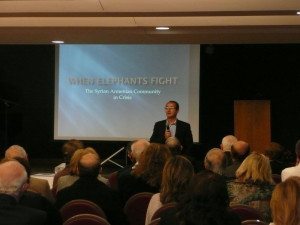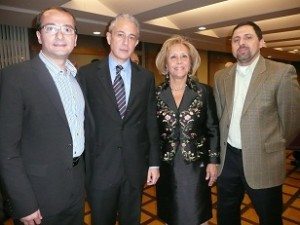By Georgi-Ann Oshagan
Greater Detroit’s Armenian community kicked off its ongoing fundraising program on Oct. 26 to support Syrian-Armenian relief efforts, as ongoing violence envelops the country’s major cities that have been home to Armenians for hundreds of years.

Sponsored by the Greater Detroit United Committee for Syrian Armenian Relief Fund, the event at St. Sarkis Lillian Arakelian Hall raised over $7,500. The committee continues to meet frequently to engage greater segments of metro Detroit’s Armenian community in its work, with ongoing phone-banking and planning of additional fundraisers underway.
Led by co-chairs Shakeh Basmajian and Shant Jamgotchian, the committee is comprised of representatives from the following metro Detroit churches and organizations: St. Sarkis Armenian Apostolic Church, St. Vartan Armenian Catholic Church, and Armenian Congregational Church; ARF Detroit “Azadamard” Gomideh; ARS “Maro,” “Shakeh,” “Sybille,” “Tsolig,” and “Zabel” Chapters; Homenetmen of Detroit; Hamazkayin of Detroit; Tekeyan Cultural Association; AYF Detroit “Kopernik Tandourjian” Chapter; Knights of Vartan of Detroit, Daughters of Vartan of Detroit; Detroit Armenian Women’s Club; and Armenian Engineers and Scientists of America-Michigan Section.
Master of Ceremonies Hayg Oshagan set the tone with a moment of silence for those who have lost their lives in the beleaguered country. Oshagan noted that he accepted the master of ceremonies job because he felt a particular responsibility to the Syrian-Armenian community for personal and political reasons connected to the 1915 Armenian Genocide and creation of the Armenian Diaspora. Oshagan’s grandfather, noted author and literary critic Hagop Oshagan, is buried in Aleppo, and was a 1915 Armenian Genocide survivor who joined his compatriots in creating the Armenian Diaspora, which survives and thrives to this day.
“We need to feel a responsibility to our families,” Oshagan said. “As diasporans, we are from different countries and we need to remember our major diasporan cities: Beirut, Aleppo, and now Los Angeles and New York. We share a sense of responsibility toward our nation when our nation is suffering in some part of the world. We are suffering when they are suffering. The Syria-Armenian community is part of the Armenian nation.”
Oshagan also emphasized that the Oct. 26 effort was not merely “an educational event.” Rather, he said, “This is an event to connect with our nation and we want this to be a successful fundraiser. The organizing committee here in Detroit is finding ways of creating unity because no matter where we are from, we are one nation. Fundraisers have occurred in many places and now it is our turn to help.”
The program’s emotional underpinning was also expressed by Dr. Taline Hagopian in her recitation of poet Baruyr Sevag’s “Gank ou ge Menank,” which was translated into English in the evening’s program booklet.

“We are few, but they call us Armenians,” she recited in Armenian. “When we were forced to leave our own land, wherever we reached, wherever we went, everywhere we left an indelible trace. We do not put ourselves above anyone, but we know ourselves. We are called Armenians.”
Guest speaker Khatchig Mouradian continued to highlight the genocide-diaspora connection to current events in Syria with his slideshow and presentation entitled, “When Elephants Fight: The Syrian-Armenian Community in Crisis.” The Armenian Weekly editor, journalist, and genocide scholar explained, “When elephants fight, it is the grass that suffers most,” and in today’s Syrian conflict, the citizens are the “grass” that is being flattened by opposing political forces.
Mouradian shared fresh news about Syria’s Armenian community and political conditions on the ground and in the region, noting that the ancient cities of Aleppo and Damascus are living museums that are being destroyed and looted as communities are caught in the conflict. “Several dozen Armenians have been killed that we know of,” he added.
Mouradian offered the poignant story of an Armenian who left Der Zor to move to Aleppo, thinking the city would be safer that the small desert community. Shortly after his move, he was killed by a bomb. Mouradian used the story to connect 1915 genocide survivors and orphans who arrived in Der Zor from the death marches to the current death and injury resulting from the continued political upheaval, which envelops Armenians whose links to that past connect them to an unstable present and an unknowable future.
“With the link to Der Zor, we have come full circle,” Mouradian observed.
Concerns over Syria’s Armenian and other minority populations center on preserving civil and religious rights, staving off censorship and oppression, and being watchful of Turkey’s influential role in the Syrian conflict and its pointed effort with other allies to overthrow the Assad regime and impose its own agenda. It’s an agenda that threatens to result in chaos and havoc in a country whose minority Christian populations “are not in the mix for cutting deals” with big political players.
Some economic experts in Ankara view and approach Aleppo as a province of Turkey, Mouradian added, noting the additional destabilizing threats of the Kurdish Question and Turkey’s continuing denial of the Armenian Genocide as factors that impact the Syrian-Armenian community and its future security. “This is a huge regional game that Turkey is trying to play.”
With regard to diasporan relief efforts, Mouradian reported that supplies are reaching the Syrian-Armenian community. He also showed a video clip of activity at a school that recently opened in Yerevan for about 250 children of Syrian-Armenian families who escaped the country for a safer haven in the homeland.
“But for every child who is in Armenia, there are 10-20 more in Syria who deserve their education, and they need our help,” Mouradian said. He concluded his presentation by noting that the Armenian community has survived in Syria by supporting the state, and that the current official community position is that the Syrian-Armenian community is neutral.
United Committee co-chair Shakeh Basmajian thanked attendees and donors, reminding them that the community has responded to emergency situations in the past—including helping Beirut’s Armenian community during the Lebanese civil war and in the aftermath of the 1988 Armenian earthquake—and must again respond to this newest crisis facing Syria’s Armenian community.
“The time to help is now,” Basmajian said, noting that with the Christmas and New Year gift-giving season approaching, families should “promise to give one gift less and use that money to donate to the Armenians of Syria.”
The evening began with an invocation by St. Sarkis host-church pastor Rev. Fr. Hrant Kevorkian and ended with a benediction by Rev. Dr. Vahan Tootikian of the Armenian Congregational Church and Father Andon Atamian of St. Vartan Armenian Catholic Church. The national anthems were sung by Rubik Mailian, who was accompanied by Helen Movsessian.
